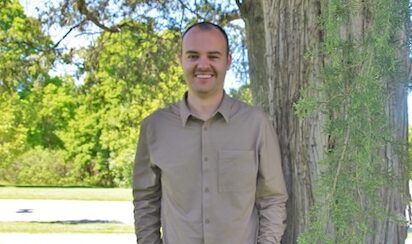
Peter Dangerfield never expected a job at Waypoint Centre for Mental Health Care would involve caring for the people who care for patients.
But making sure every employee feels supported and fulfilled is a vital objective at the Penetanguishene-based hospital and, when it comes to prioritizing staff wellness, people like Dangerfield play a key role. He is a therapist in the Frontline Wellness program, a free, confidential service to help support the mental health of health care workers. His job is to help those delivering mental health and addiction care deal with their occupational stress through counselling.
“I see nurses, doctors, support staff, managers – whoever needs it,” he said. “It says a lot about the organization that there are so many programs that support the workers.”
Waypoint is a 315-bed academic and teaching hospital that provides specialized mental health, addiction and geriatric care. It serves some of the most complex and disadvantaged individuals in Ontario, and is the sole provider of high-secure forensic mental health services in the province.
Caring for the emotional and psychological well-being of staff is deeply important to Waypoint, as is sharing expertise for the broader benefit of the health care workforce. Waypoint provides leadership to guide organizational health and well-being for all central Ontario hospitals, and is growing capacity in the system by using a collaborative approach to maturing wellness programs.
This includes adopting a Stepped Care Model – developed as a digital tool – to enable health care workers accessing the right level of care to support resilience and mental health. More than 300 leaders in hospitals and community support services in central Ontario have participated in training to learn how to use the tool.
Another component of caring for staff is the Traumatic Incident Support Team (TIST), a peer-led initiative that provides around-the-clock support to Waypoint staff and patients. Dangerfield currently co-leads the team, whose members come when called – including after hours, in the middle of the night, on holidays or on weekends. It is a voluntary service of skilled and concerned Waypoint employees with advanced training in critical incident stress management and psychological first aid.
“Things happen at work that are sometimes unsettling or unnerving, and we’re there to help them normalize or rationalize what’s occurred,” he explained.
Dangerfield started at Waypoint six years ago in the Forensic Security Office, working part time as an operational support worker. While working toward a bachelor’s degree in social work, he landed a six-month placement on the Forensic Assessment Program (FAP), which provides comprehensive, multi-disciplinary assessments for each patient admitted from the courts, provincial and federal correctional facilities, and provincial regional psychiatric hospitals.
He was later hired as a social worker on the Beausoleil Program, where staff focus on meeting the long-term needs of patients with a major mental illness and personality disorder diagnoses. He spent a year there before returning to FAP full time, and a few years later moved to his current position in Frontline Wellness.
“Helping people improve their lives is very fulfilling,” he said. “It’s really nice when people sit before you with their challenges or with things they can’t make sense of, and then in a few weeks they’re feeling more confident and their challenges don’t seem as heavy. That’s quite gratifying.”

